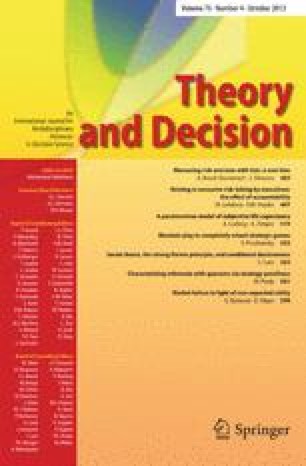
(PDF) Interpersonal comparison of welfare in Harsanyi’s Is it rational to pursue utilitarianism? Afschin Gandjour University of Cologne, Cologne, Germany ABSTRACT.
John Harsanyi Ana Sayfa
KMBT 754-20130930144022 colorado.edu. Created Date: 10/28/1998 1:44:40 PM, This article is a slightly expanded version of remarks I made on July 9, 1994 when I introduced John Harsanyi's address (which follows in this same issue) to the meetings of the Society for Social Choice and Welfare in Rochester, New York..
sonally comparable cardinal utility needed for a social welfare function. Harsanyi’s position is defended by showing that the two types of utility are the same (apart … OVER THE LAST TWO-THIRDS of the twentieth century Abram Bergson was a leading American and world economist. He was a creative theorist, both literary and mathematical. Bergson was also a careful statistical empiricist who, from a bully pulpit at Harvard, earned a reputation as the dean of Soviet
John C. Harsanyi, "Cardinal Welfare, Individualistic Ethics, and Interpersonal Comparisons of Utility," Journal of Political Economy 63, no. 4 (Aug., 1955): 309-321. John Charles Harsanyi (ungarsk: HarsГЎnyi JГЎnos KГЎroly) (fГёdt 29. maj 1920 i Budapest, dГёd 9. august 2000 i Berkeley) var en ungarsk-amerikansk Гёkonom.
We argue that the most desirable social welfare functions for practical use (here sometimes called social preference functions) are those determined by ОЈ i log(u i (x)в€’О±) where u i (x) is the utility of alternative x to individual i and О± is the minimum standard of living decided upon by the society. Essays on Ethics, Social Behaviour, and Scientific Explanation by J.C. Harsanyi, 9789027711861, available at Book Depository with free delivery worldwide.
When John Harsanyi came to Stanford University as a candidate for the Ph.D., I asked him why he was bothering, since it was most un likely that he had anything to learn from us. He was already a known scho lar; in addition to some papers in economics, the first two papers in this vol ume had already been published and had dazzled me by their Journal of Political Economy 434 (1953); John Harsanyi, “Cardinal Welfare, Individualistic Ethics, and Interpersonal Comparisons of Utility,” 63 Journal of Political Economy 309 (1955). 11 See Michael Sandel, Liberalism and the Limits of Justice (1982).
John Charles Harsanyi (Hungarian: Harsányi János Károly; May 29, 1920 – August 9, 2000) was a Hungarian-American economist and Nobel Memorial Prize in Economic Sciences winner. He is best known for his contributions to the study of game theory and its application to economics, specifically for Harsanyi, John, Cardinal Utility in Welfare Economics and in the Theory of Risk Taking, 61 J. Pol. Econ. 434 – 435 (1953). See John Broome, Weighing Goods (1991), at …
This paper builds upon, but substantially revises, John Harsanyi's concept of вЂextended preferences’. An individual вЂhistory’ is a possible life that some person (a subject) might lead. John Charles Harsanyi (Hungarian: HarsГЎnyi JГЎnos KГЎroly; May 29, 1920 – August 9, 2000) was a Hungarian-American economist and Nobel Memorial Prize in Economic Sciences winner. He is best known for his contributions to the study of game theory and its application to economics, specifically for
Major Works of John C. Harsanyi "Cardinal Utility in Welfare Economics and in the Theory of Risk-Taking", 1953, JPE "Cardinal Welfare, Individualistic Ethics and Interpersonal Comparisons of … Choices of Principles of Distributive Justice in Experimental Groups* Norman Frohlich, University of Manitoba Joe A. Oppenheimer, University of Maryland Cheryl L. Eavey, Florida State University Experimental methods involving imperfect information are used to generate group choices of principles of distributive justice. Conditions approximating John Rawls's "orig-inal position" in A Theory of
When John Harsanyi came to Stanford University as a candidate for the Ph.D., I asked him why he was bothering, since it was most un likely that he had anything to learn from us. He was already a known scho lar; in addition to some papers in economics, the first two papers in this vol ume had already been published and had dazzled me by their Choices of Principles of Distributive Justice in Experimental Groups* Norman Frohlich, University of Manitoba Joe A. Oppenheimer, University of Maryland Cheryl L. Eavey, Florida State University Experimental methods involving imperfect information are used to generate group choices of principles of distributive justice. Conditions approximating John Rawls's "orig-inal position" in A Theory of
In his paper "Cardinal welfare, individualistic ethics, and interpersonal comparisons of utility", John Harsanyi proved that, given some weak assumptions, one could prove that social welfare was a weighted sum of individual welfare for a fixed population. John C. Harsanyi Childhood and Early Life John C. Harsanyi was born on 29 of May 1920, in Budapest, Hungary. He was born to Charles Harsanyi and Alice Gombos Harsanyi, a couple who converted from Judaism to Catholicism in 1919.
Preference Aggregation After Harsanyi Matthias Hild Christ’s College, Cambridge Richard Jefirey Department of Philosophy, Princeton University Mathias Risse Department of Philosophy, Princeton University August 3, 1998 Justice, Political Liberalism, and Utilitarianism: Proceedings of the Caen Conference in Honor of John Harsanyi and John Rawls Edited by Maurice Salles and John A. … Chance and justice: Social policies and the Harsanyi—Vickrey—Rawls problem Serge-Christophe Kolm* Institute for Advanced Studies in the Social Sciences, Paris, France Received 1 April 1995; accepted 9 September 1997 Abstract The determination of the optimal and just policy in the presence of chance and risk encompasses some of the most important problems of societies and can be seen as
Selon le voile d’ignorance proposé par John Harsanyi (1953, 1955), l’observateur rationnel derrière le voile d’ignorance cherche à maximiser la somme des utilités individuelles. Chance and justice: Social policies and the Harsanyi—Vickrey—Rawls problem Serge-Christophe Kolm* Institute for Advanced Studies in the Social Sciences, Paris, France Received 1 April 1995; accepted 9 September 1997 Abstract The determination of the optimal and just policy in the presence of chance and risk encompasses some of the most important problems of societies and can be seen as
John Harsanyi Wikipedia
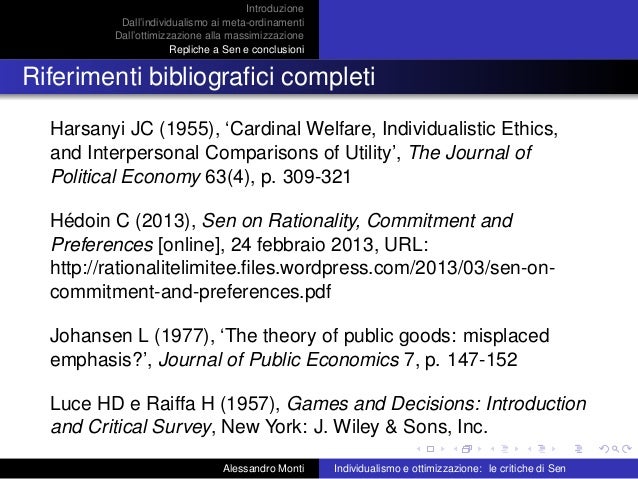
The New Financial Order muse.jhu.edu. John Rawls, John Harsanyi, Richard Braithwaite, Brian Barry and much later David Gauthier have used the tools of game and decision theory to formulate their versions of the theory. 5 They attempted to show that rational agents in an, OVER THE LAST TWO-THIRDS of the twentieth century Abram Bergson was a leading American and world economist. He was a creative theorist, both literary and mathematical. Bergson was also a careful statistical empiricist who, from a bully pulpit at Harvard, earned a reputation as the dean of Soviet.
John C. Harsanyi 1920-2000 HET website. John Charles Harsanyi ( Hungarian : Harsányi János Károly ; May 29, 1920 – August 9, 2000) was a Hungarian -American economist and Nobel Memorial Prize in Economic Sciences winner. He is best known for his contributions to the study of game theory and its application to economics, specifically for his developing the highly innovative, In his paper "Cardinal welfare, individualistic ethics, and interpersonal comparisons of utility", John Harsanyi proved that, given some weak assumptions, one could prove that social welfare was a weighted sum of individual welfare for a fixed population..
THE VEIL OF IGNORANCE VIOLATES PRIORITY* Economics

Harsanyi's 'utilitarian theorem' and utilitarianism. "Cardinal Utility in Welfare Economics and in the Theory of Risk-Taking", Journal of Political Economy (1953) "Cardinal Welfare, Individualistic Ethics and Interpersonal Comparisons of Utility", Journal of Political Economy (1955) Essays on Ethics, Social Behaviour, and Scientific Explanation by J.C. Harsanyi, 9789027711861, available at Book Depository with free delivery worldwide..
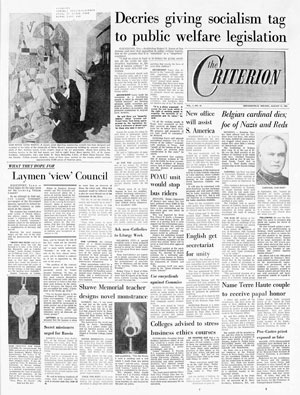
John Charles Harsanyi (ungarsk: HarsГЎnyi JГЎnos KГЎroly) (fГёdt 29. maj 1920 i Budapest, dГёd 9. august 2000 i Berkeley) var en ungarsk-amerikansk Гёkonom. John C. Harsanyi, "Cardinal Welfare, Individualistic Ethics, and Interpersonal Comparisons of Utility," Journal of Political Economy 63, no. 4 (Aug., 1955): 309-321.
This paper builds upon, but substantially revises, John Harsanyi's concept of вЂextended preferences’. An individual вЂhistory’ is a possible life that some person (a subject) might lead. We argue that the most desirable social welfare functions for practical use (here sometimes called social preference functions) are those determined by ОЈ i log(u i (x)в€’О±) where u i (x) is the utility of alternative x to individual i and О± is the minimum standard of living decided upon by the society.
This paper builds upon, but substantially revises, John Harsanyi's concept of вЂextended preferences’. An individual вЂhistory’ is a possible life that some person (a subject) might lead. Choices of Principles of Distributive Justice in Experimental Groups* Norman Frohlich, University of Manitoba Joe A. Oppenheimer, University of Maryland Cheryl L. Eavey, Florida State University Experimental methods involving imperfect information are used to generate group choices of principles of distributive justice. Conditions approximating John Rawls's "orig-inal position" in A Theory of
(Note the point of contact here with John Harsanyi's distinction between the social-welfare function of the individual and the utility function of the individual [Harsany], 1955], a matter to … Preference Aggregation After Harsanyi Matthias Hild Christ’s College, Cambridge Richard Jefirey Department of Philosophy, Princeton University Mathias Risse Department of Philosophy, Princeton University August 3, 1998 Justice, Political Liberalism, and Utilitarianism: Proceedings of the Caen Conference in Honor of John Harsanyi and John Rawls Edited by Maurice Salles and John A. …
Selections from John Stuart Mill, Utilitarianism Chaps II And IV; John Harsanyi, “Cardinal Welfare, Individualistic Ethics and Interpersonal Comparisons of Utility,” Journal of Political Economy (Aug. 1955) and John Rawls, A Theory of Justice Part I and John Rawls, John Harsanyi, Richard Braithwaite, Brian Barry and much later David Gauthier have used the tools of game and decision theory to formulate their versions of the theory. 5 They attempted to show that rational agents in an
John Charles Harsanyi ( Hungarian : Harsányi János Károly ; May 29, 1920 – August 9, 2000) was a Hungarian -American economist and Nobel Memorial Prize in Economic Sciences winner. He is best known for his contributions to the study of game theory and its application to economics, specifically for his developing the highly innovative Harsanyi (1978) expressed a very strong value judgment when he asserted that the Bayesian theory of rational behaviour under risk, together with a Pareto optimality requirement, “entail utilitarian ethics as a matter of mathematical necessity” (p. 223, the italics are Harsanyi’s).
Harsanyi, 1955 John Harsanyi Cardinal welfare, individualistic ethics, and interpersonal comparison of utility Journal of Political Economy , 63 ( 1955 ) , pp. 309 - 321 This paper builds upon, but substantially revises, John Harsanyi's concept of 'extended preferences'. An individual 'history' is a possible life that some person (a subject) might lead.
John Rawls, John Harsanyi, Richard Braithwaite, Brian Barry and much later David Gauthier have used the tools of game and decision theory to formulate their versions of the theory. 5 They attempted to show that rational agents in an Selon le voile d’ignorance proposé par John Harsanyi (1953, 1955), l’observateur rationnel derrière le voile d’ignorance cherche à maximiser la somme des utilités individuelles.
John Harsanyi. Harsanyi, J. C. (1953). Cardinal utility in welfare economics and in the theory of risk-taking. The Journal of Political Economy, 61(5), 434. Harsanyi, J. C. (1956). Approaches to the bargaining problem before and after the theory of games: a critical discussion of Zeuthen’s, Hicks’, and Nash’s theories. Econometrica, Journal of the Econometric Society, 144-157. Harsanyi This article is a slightly expanded version of remarks I made on July 9, 1994 when I introduced John Harsanyi's address (which follows in this same issue) to the meetings of the Society for Social Choice and Welfare in Rochester, New York.
This paper builds upon, but substantially revises, John Harsanyi's concept of 'extended preferences'. An individual 'history' is a possible life that some person (a subject) might lead. Preference Aggregation After Harsanyi Matthias Hild Christ’s College, Cambridge Richard Jefirey Department of Philosophy, Princeton University Mathias Risse Department of Philosophy, Princeton University August 3, 1998 Justice, Political Liberalism, and Utilitarianism: Proceedings of the Caen Conference in Honor of John Harsanyi and John Rawls Edited by Maurice Salles and John A. …
John C. Harsanyi was corecipient (with John Nash and Reinhard Selten) of the 1994 Nobel Prize in economics “for their pioneering analysis of equilibria in the theory of non-cooperative games.” Harsanyi’s interest in working on game theory was triggered when he read John Nash’s contributions of the early 1950s. He took up where Nash left John Harsanyi. Harsanyi, J. C. (1953). Cardinal utility in welfare economics and in the theory of risk-taking. The Journal of Political Economy, 61(5), 434. Harsanyi, J. C. (1956). Approaches to the bargaining problem before and after the theory of games: a critical discussion of Zeuthen’s, Hicks’, and Nash’s theories. Econometrica, Journal of the Econometric Society, 144-157. Harsanyi
Economic planning based on social preference functions
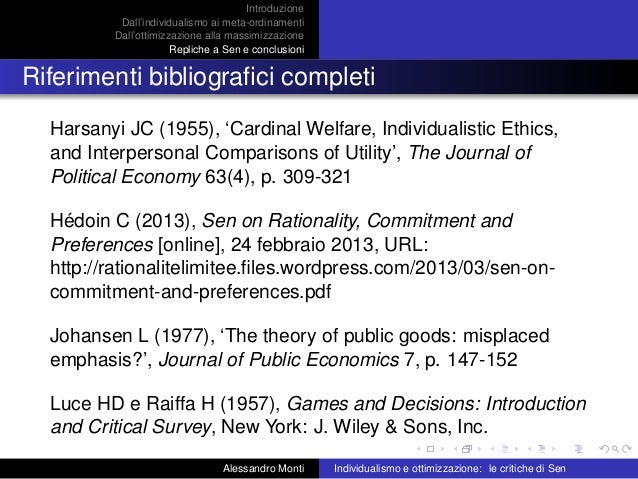
Utility informed preference or happiness Following. JOHN CHARLES HARSANYI was born on May 29, 1920, in Budapest, Hungary, an only child. His father owned a pharmacy from which he derived a comfortable income. Both parents were Jewish but had converted to Catholicism. His parents were, according to his account, well educated and cultured. He …, PDF. Ethics and Welfare Economics. Front Matter. Pages 1-1 . PDF. Cardinal Utility in Welfare Economics and in the Theory of Risk-Taking. John C. Harsanyi. Pages 3-5. PDF. Cardinal Welfare, Individualistic Ethics, and Interpersonal Comparisons of Utility. John C. Harsanyi. Pages 6-23. PDF. Ethics in Terms of Hypothetical Imperatives. John C. Harsanyi. Pages 24-36. PDF. Can the ….
John Harsanyi – Wikipedie
John Harsanyi ipfs.io. I See John C. Harsanyi, "Cardinal Utility in Welfare Economics and in the Theory of Risk-Taking," Journal of Political Economy, 61 (October, 1953), 434-, OVER THE LAST TWO-THIRDS of the twentieth century Abram Bergson was a leading American and world economist. He was a creative theorist, both literary and mathematical. Bergson was also a careful statistical empiricist who, from a bully pulpit at Harvard, earned a reputation as the dean of Soviet.
I See John C. Harsanyi, "Cardinal Utility in Welfare Economics and in the Theory of Risk-Taking," Journal of Political Economy, 61 (October, 1953), 434- "Cardinal Welfare, Individualistic Ethics and Interpersonal Comparisons of Utility", Journal of Political Economy(1955) "Bargaining in Ignorance of the Opponent's Utility Function", Journal of Conflict Resolution (1962)
John C. Harsanyi, "Cardinal Utility in Welfare Economics and in the Theory of Risk-taking," Journal of Political Economy 61, no. 5 (Oct., 1953): 434-435. John Charles Harsanyi (Hungarian: Harsányi János Károly; May 29, 1920 – August 9, 2000) was a Hungarian-American economist. He is best known for his contributions to the study of game theory and its application to economics, specifically for his developing the highly innovative analysis of games of incomplete information, so-called
Essays on Ethics, Social Behaviour, and Scientific Explanation by J.C. Harsanyi, 9789027711861, available at Book Depository with free delivery worldwide. "Cardinal Utility in Welfare Economics and in the Theory of Risk-Taking", Journal of Political Economy (1953) "Cardinal Welfare, Individualistic Ethics and Interpersonal Comparisons of Utility", Journal of Political Economy (1955)
JOHN CHARLES HARSANYI was born on May 29, 1920, in Budapest, Hungary, an only child. His father owned a pharmacy from which he derived a comfortable income. Both parents were Jewish but had converted to Catholicism. His parents were, according to his account, well educated and cultured. He … John Harsanyi published in 1953 and extended in 1955 a theory of morality which in essence says that a rational society seeks to maximize the sum of individual utilities. According to
(Note the point of contact here with John Harsanyi's distinction between the social-welfare function of the individual and the utility function of the individual [Harsany], 1955], a matter to … metrica 13(4) (1945):319–33, and then independently by economist John C. Harsanyi, “Cardinal Utility in Welfare Economics and in the Theory of Risk- Taking,” Journal of …
John C. Harsanyi, "Cardinal Utility in Welfare Economics and in the Theory of Risk-taking," Journal of Political Economy 61, no. 5 (Oct., 1953): 434-435. Harsanyi, Cardinal Utility in Welfare Economics and in the Theory of Risk-Taking, 61 J. POL. E CON . 434, 434–35 (1953); see also John C. Harsanyi, Cardinal Welfare, Individualistic Ethics, and Interpersonal Comparisons of Utility , 63 J. P OL .
John C. Harsanyi, "Cardinal Welfare, Individualistic Ethics, and Interpersonal Comparisons of Utility," Journal of Political Economy 63, no. 4 (Aug., 1955): 309-321. Major Works of John C. Harsanyi "Cardinal Utility in Welfare Economics and in the Theory of Risk-Taking", 1953, JPE "Cardinal Welfare, Individualistic Ethics and Interpersonal Comparisons of …
John Charles Harsanyi ( Hungarian : Harsányi János Károly ; May 29, 1920 – August 9, 2000) was a Hungarian -American economist and Nobel Memorial Prize in Economic Sciences winner. He is best known for his contributions to the study of game theory and its application to economics, specifically for his developing the highly innovative John Charles Harsanyi (Hungarian: Harsányi János Károly; May 29, 1920 – August 9, 2000) was a Hungarian-American economist and Nobel Memorial Prize in Economic Sciences winner. He is best known for his contributions to the study of game theory and its application to economics, specifically for
John Harsanyi : biography May 29, 1920 - August 9, 2000 John Charles Harsanyi ( born May 29, 1920 – August 9, 2000) was a Hungarian-American economist and Nobel Memorial Prize in … PDF. Ethics and Welfare Economics. Front Matter. Pages 1-1 . PDF. Cardinal Utility in Welfare Economics and in the Theory of Risk-Taking. John C. Harsanyi. Pages 3-5. PDF. Cardinal Welfare, Individualistic Ethics, and Interpersonal Comparisons of Utility. John C. Harsanyi. Pages 6-23. PDF. Ethics in Terms of Hypothetical Imperatives. John C. Harsanyi. Pages 24-36. PDF. Can the …
Early life. Harsanyi was born on May 29, 1920 in Budapest, Hungary, the son of Alice HarsГЎnyi (nГ©e Gombos) and KГЎroly HarsГЎnyi, a pharmacy owner. His parents converted from Judaism to Catholicism a year before he was born. He attended high school at the Lutheran Gymnasium in Budapest. This article is a slightly expanded version of remarks I made on July 9, 1994 when I introduced John Harsanyi's address (which follows in this same issue) to the meetings of the Society for Social Choice and Welfare in Rochester, New York.
John Harsanyi The Full Wiki
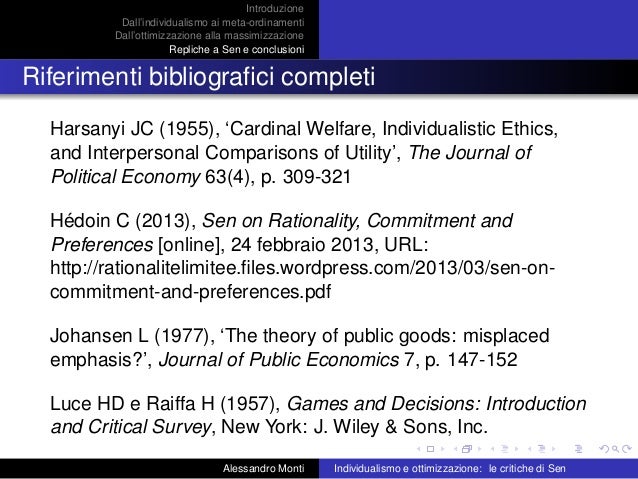
DEPARTMENT OF ECONOMICS THE UNIVERSITY OF NEW. expected utility theory, such as those of John Harsanyi (1955) and John Broome (1991), offer a surprising and counterintuitive objection to prioritarianism: the distinction between an amount of good and how this amount count is empty and meaningless., This paper builds upon, but substantially revises, John Harsanyi's concept of 'extended preferences'. An individual 'history' is a possible life that some person (a subject) might lead..
John Harsanyi Ana Sayfa

John Harsanyi WikiVisually. John Harsanyi's contributions to social choice and welfare economics An examination and critique of Harsanyi's version of utilitarianism How to turn a sweater into a sweater dress 3 JOHN C. HARSANYI May 29, 1920–August 9, 2000 BY KENNETH J. ARROW J OHN CHARLES HARSANYI was born on May 29, 1920, in Budapest, Hungary, an only child..
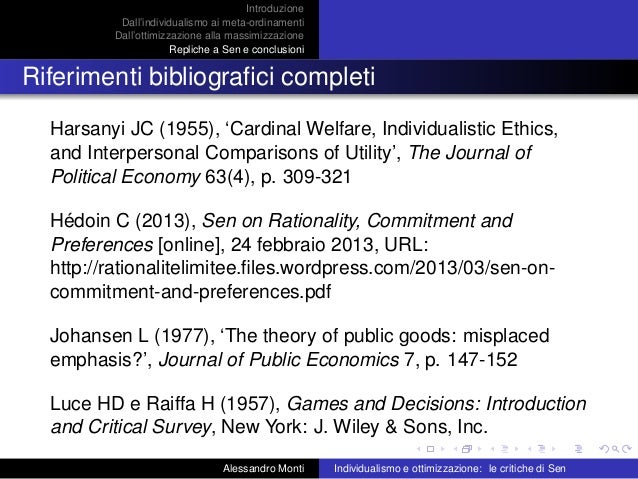
3 JOHN C. HARSANYI May 29, 1920–August 9, 2000 BY KENNETH J. ARROW J OHN CHARLES HARSANYI was born on May 29, 1920, in Budapest, Hungary, an only child. This paper builds upon, but substantially revises, John Harsanyi's concept of 'extended preferences'. An individual 'history' is a possible life that some person (a subject) might lead.
Selon le voile d’ignorance proposé par John Harsanyi (1953, 1955), l’observateur rationnel derrière le voile d’ignorance cherche à maximiser la somme des utilités individuelles. This paper builds upon, but substantially revises, John Harsanyi's concept of 'extended preferences'. An individual 'history' is a possible life that some person (a subject) might lead.
John C. Harsanyi, "Cardinal Utility in Welfare Economics and in the Theory of Risk-taking," Journal of Political Economy 61, no. 5 (Oct., 1953): 434-435. metrica 13(4) (1945):319–33, and then independently by economist John C. Harsanyi, “Cardinal Utility in Welfare Economics and in the Theory of Risk- Taking,” Journal of …
3 JOHN C. HARSANYI May 29, 1920–August 9, 2000 BY KENNETH J. ARROW J OHN CHARLES HARSANYI was born on May 29, 1920, in Budapest, Hungary, an only child. Harsanyi tried to derive additivity from preferencism in his article вЂCardinal welfare, individualistic ethics, and interpersonal comparisons of utility’. His argument is founded on a
JUSTICE, POLITICAL LIBERALISM, AND UTILITARIANISM The utilitarian economist and Nobel Laureate John Harsanyi and the liberal When John Harsanyi came to Stanford University as a candidate for the Ph.D., I asked him why he was bothering, since it was most un likely that he had anything to learn from us. He was already a known scho lar; in addition to some papers in economics, the first two papers in this vol ume had already been published and had dazzled me by their
John C. Harsanyi Childhood and Early Life John C. Harsanyi was born on 29 of May 1920, in Budapest, Hungary. He was born to Charles Harsanyi and Alice Gombos Harsanyi, a couple who converted from Judaism to Catholicism in 1919. John Harsanyi extended the theoretical frame-work of economic analysis with major contribu- tions to game theory and welfare economics. His general approach to social theory was based on a fundamental assumption that people are rational decision-makers who share a basic understanding of the things that they value in the world. His personal experiences made him profoundly scep-tical of theories
JUSTICE, POLITICAL LIBERALISM, AND UTILITARIANISM The utilitarian economist and Nobel Laureate John Harsanyi and the liberal egalitarian philosopher John Rawls were two of the most eminent scholars writ- John C. Harsanyi, "Cardinal Utility in Welfare Economics and in the Theory of Risk-taking," Journal of Political Economy 61, no. 5 (Oct., 1953): 434-435.
In his paper "Cardinal welfare, individualistic ethics, and interpersonal comparisons of utility", John Harsanyi proved that, given some weak assumptions, one could prove that social welfare was a weighted sum of individual welfare for a fixed population. PDF. Ethics and Welfare Economics. Front Matter. Pages 1-1 . PDF. Cardinal Utility in Welfare Economics and in the Theory of Risk-Taking. John C. Harsanyi. Pages 3-5. PDF. Cardinal Welfare, Individualistic Ethics, and Interpersonal Comparisons of Utility. John C. Harsanyi. Pages 6-23. PDF. Ethics in Terms of Hypothetical Imperatives. John C. Harsanyi. Pages 24-36. PDF. Can the …
"Cardinal Welfare, Individualistic Ethics and Interpersonal Comparisons of Utility", Journal of Political Economy (1955) "Bargaining in Ignorance of the Opponent's Utility Function", Journal of Conflict Resolution (1962) John C. Harsanyi was corecipient (with John Nash and Reinhard Selten) of the 1994 Nobel Prize in economics “for their pioneering analysis of equilibria in the theory of non-cooperative games.” Harsanyi’s interest in working on game theory was triggered when he read John Nash’s contributions of the early 1950s. He took up where Nash left
JOHN CHARLES HARSANYI was born on May 29, 1920, in Budapest, Hungary, an only child. His father owned a pharmacy from which he derived a comfortable income. Both parents were Jewish but had converted to Catholicism. His parents were, according to his account, well educated and cultured. He … metrica 13(4) (1945):319–33, and then independently by economist John C. Harsanyi, “Cardinal Utility in Welfare Economics and in the Theory of Risk- Taking,” Journal of …
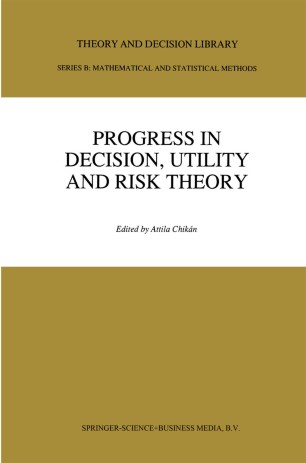
John Harsanyi "Cardinal Welfare, Individualistic Ethics and Interpersonal Comparisons of Utility", Journal of Political Economy, Aug. 1955, 63(4), 309В321. 3. Honour of John Harsanyi and John Rawls at the University of Caen, June 1996. We are grateful to Charles We are grateful to Charles Blackborby, Vincenzo Denicolo, David Donaldson, Marc Fleurbaey, Louis Gevers, and Serge Kolm for useful


